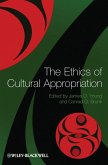Essay from the year 2018 in the subject Philosophy - Practical (Ethics, Aesthetics, Culture, Nature, Right, ...), grade: A, , course: Law, language: English, abstract: Cultural appropriation is defined as taking intellectual property, traditional knowledge, cultural expressions or artefacts from someone else's culture without permission. This also includes the unauthorised use of another's culture's dance, dress, music, language, folklore, cuisine, traditional medicine, religious symbols and the likes. Any process of borrowing necessarily involves acts of appropriation, which are means by which borrowing occurs. The first problem lies in the fact that developing countries like Kenya have not sufficiently defined their cultural industries within the Intellectual Property context. It is only recently that cultural industries have started realizing the full economic benefits that would be open to them, should they be granted adequate Intellectual Property protection and promotion.
Dieser Download kann aus rechtlichen Gründen nur mit Rechnungsadresse in A, B, BG, CY, CZ, D, DK, EW, E, FIN, F, GR, HR, H, IRL, I, LT, L, LR, M, NL, PL, P, R, S, SLO, SK ausgeliefert werden.









